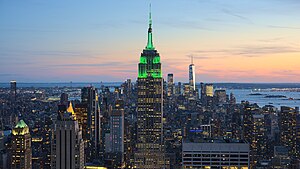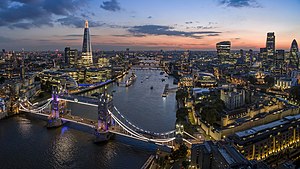Global city
A global city[a] is a city that serves as a primary node in the global economic network. The concept originates from geography and urban studies, based on the thesis that globalization has created a hierarchy of strategic geographic locations with varying degrees of influence over finance, trade, and culture worldwide.[1] The global city represents the most complex and significant hub within the international system, characterized by links binding it to other cities that have direct, tangible effects on global socioeconomic affairs.[2]
The criteria of a global city vary depending on the source.[3] Common features include a high degree of urban development, a large population, the presence of major multinational companies, a significant and globalized financial sector, a well-developed and internationally linked transportation infrastructure, local or national economic dominance, high quality educational and research institutions, and a globally influential output of ideas, innovations, or cultural products. Quintessential examples, based on most indices and research, include New York City, London, Paris, and Tokyo.
Origin and terminology
The term 'global city' was popularized by sociologist Saskia Sassen in her 1991 book, The Global City: New York, London, Tokyo.[4] Before then, other terms were used for urban centers with roughly the same features. The term 'world city', meaning a city heavily involved in global trade, appeared in a May 1886 description of Liverpool, by The Illustrated London News;[5] British sociologist and geographer Patrick Geddes used the term in 1915.[6] The term 'megacity' entered common use in the late 19th or early 20th century, the earliest known example being a publication by the University of Texas in 1904.[7] In the 21st century, the terms are usually focused on a city's financial power and high technology infrastructure.[8][9]
Criteria

Competing groups have devised competing means to classify and rank world cities and to distinguish them from other cities.[6] Although there is a consensus on the leading world cities,[11] the chosen criteria affect which other cities are included.[6] Selection criteria may be based on a yardstick value (e.g., if the producer-service sector is the largest sector then city X is a world city)[6] or on an imminent determination (if the producer-service sector of city X is greater than the combined producer-service sectors of N other cities then city X is a world city.)[6] Although criteria are variable and fluid, typical characteristics of world cities include:[12]
- The most prominent criterion has been providing a variety of international financial services,[13] notably in finance, insurance, real estate, banking, accountancy, and marketing; and their amalgamation of financial headquarters, a stock exchange, and other major financial institutions,
- Headquarters of numerous multinational corporations,
- Domination of the trade and economy of a large surrounding area,
- Major manufacturing centers with port and container facilities,
- Considerable decision-making power daily and at a global level,
- Centers of new ideas and innovation in business, economics, and culture,
- Centers of digital and other media and communications for global networks,
- The dominance of the national region with great international significance,
- The high percentage of residents employed in the services sector and information sector,
- High-quality educational institutions, including renowned universities and research facilities; and attracting international student attendance,[14]
- Multi-functional infrastructure offering some of the best legal, medical, and entertainment facilities in the country,
- High diversity in language, culture, religion, and ideologies.
General rankings
Global city rankings are numerous.[15] New York City, London, Tokyo, and Paris are the most commonly mentioned.[16][17]
GaWC World Cities
The Globalization and World Cities Research Network (GaWC) is a think tank that studies the relationships between world cities in the context of globalization. It is based in the geography department of Loughborough University in Leicestershire, United Kingdom. GaWC was founded by Peter J. Taylor in 1998.[18] Together with Jon Beaverstock and Richard G. Smith, they create the GaWC's biennial categorization of world cities into "Alpha", "Beta" and "Gamma" tiers, based upon their international connectedness.[19] The cities in the top two classifications in the 2024 edition are:[20]
Alpha ++
Alpha +
Global Cities Index (Kearney)
In 2008, the American journal Foreign Policy, working with the consulting firm A.T. Kearney and the Chicago Council on Global Affairs, published a ranking of global cities based on consultation with Saskia Sassen, Witold Rybczynski, and others.[21][22] The ranking is based on 27 metrics across five dimensions: business activity, human capital, information exchange, cultural experience, and political engagement.[23] The top ranked cities in 2024 are:[24]
Global Cities Index (Oxford Economics)
Advisory firm Oxford Economics released its Global Cities Index in 2024, ranking the world's largest 1,000 cities based on 27 indicators across five categories (economics, human capital, quality of life, environment, and governance) with more weight on economic factors. The top ranked cities in 2024 are:[25]
Global Power City Index
The Tokyo-based Institute for Urban Strategies at The Mori Memorial Foundation, issued a study of global cities in 2008. They are ranked in six categories: economy, research and development, cultural interaction, livability, environment, and accessibility, with 70 individual indicators among them. The top ten world cities are also ranked by subjective categories, including manager, researcher, artist, visitor and resident.[26][27] The top 10 cities in 2023 are:[26]
World's Best Cities ranking
Consultancy firm Resonance publishes the World’s Best Cities ranking. They are ranked in three categories: livability, lovability and prosperity, each of them using different factors. The top 10 cities in 2024 are:[28]
Financial rankings
Global Financial Centres Index
Strength as a financial center has become one of the pre-eminent indicators of a global city's ranking. As of 2024,[29] the cities representing the top ten financial centers according to the Global Financial Centres Index by the think tank China Development Institute and analytics firm Z/Yen are:[30]
The Wealth Report
Estate agent Knight Frank LLP and the Citi Private Bank publish The Wealth Report, which includes a "Global Cities Survey", evaluating the most important cities to high-net-worth individuals (HNWIs, having over $25 million of investable assets each). Criteria are economic activity, political power, knowledge and influence, and quality of life.[31][32] The most important cities to UHNWIs in 2022 are:[33]
See also
- Caput Mundi
- City quality of life indices
- Ecumenopolis
- Financial centre
- Metropolitan and urban regions with the largest foreign-born populations
- Globalization
- List of cities by GDP
- Megalopolis
- Metropolis
- Primate city
- Ranally city rating system
Notes
- ^ Also known as a power city, world city, alpha city, or world center
References
- ^ Lenormand, Maxime; Gonçalves, Bruno; Tugores, Antònia; Ramasco, José J. (2015). "Human diffusion and city influence". Journal of the Royal Society Interface. 12 (109): 20150473. doi:10.1098/rsif.2015.0473. PMC 4535413. PMID 26179991.
- ^ Sassen, Saskia (July 2001). "The global city: strategic site/new frontier". Seminar Magazine. No. 503. Archived from the original on 18 October 2006.
- ^ "global city". Britannica. Archived from the original on 20 October 2022. Retrieved 20 October 2022.
- ^ Sassen, Saskia. The Global City: New York, London, Tokyo. 1991. Princeton University Press. ISBN 0-691-07063-6. Archived 16 March 2015 at the Wayback Machine.
- ^ Belchem, John (18 December 2009). "The Empire in One City? Liverpool's Inconvenient Imperial Past". Reviews in History. Archived from the original on 23 June 2012. Retrieved 9 May 2012.
- ^ a b c d e Doel, M., & Hubbard, P., (2002), "Taking World Cities Literally: Marketing the City in a Global Space of flows", City, vol. 6, no. 3, pp. 351–368. Subscription required.
- ^ Hemisfile: Perspectives on Political and Economic Trends in the Americas. Institute of the Americas. 1994.
- ^ "Asian Cities Pay Hidden Price for Global Status". The Diplomat. 15 February 2015. Archived from the original on 1 February 2016. Retrieved 25 January 2016.
- ^ "The World's Most Influential Cities". Forbes. 14 August 2014. Archived from the original on 5 September 2017. Retrieved 29 August 2017.
- ^ "What are the characteristics of world cities and megacities, and how has their distribution changed since 1950? – HBK Portal". Archived from the original on 17 November 2022. Retrieved 17 November 2022.
- ^ GaWC Research Bulletin 5 Archived 8 August 2011 at the Wayback Machine, GaWC, Loughborough University, 28 July 1999
- ^ Pashley, Rosemary. "HSC Geography". Pascal Press, 2000, p.164
- ^ J.V. Beaverstock, World City Networks 'From Below' Archived 8 March 2006 at the Wayback Machine, GaWC, Loughborough University, 29 September 2010
- ^ K. O'Connor, International Students and Global Cities Archived 5 February 2006 at the Wayback Machine, GaWC, Loughborough University, 17 February 2005
- ^ "Decoding City Performance". Jll.co.uk. 2 April 2019. Archived from the original on 16 October 2019. Retrieved 16 October 2019.
- ^ "Struggling Giants". University of Minnesota Press. Archived from the original on 17 January 2021. Retrieved 31 December 2020.
- ^ Abrahamson, Mark (2004). Global cities (PDF) (1st ed.). New York: Oxford University Press. p. 4. ISBN 978-0195142044. Archived (PDF) from the original on 11 January 2021. Retrieved 9 January 2021.
- ^ Taylor, Peter J. (2004). World city network: a global urban analysis. Routledge. p. ix. ISBN 0-415-30249-8. Retrieved 10 October 2010.
- ^ Donald, Stephanie; Gammack, John G. (2007). Tourism and the branded city. London: Ashgate Publishing. p. 23. ISBN 978-0-7546-4829-1. Archived from the original on 30 June 2023. Retrieved 10 October 2010.
- ^ "World Cities 2024". GaWC. Retrieved 1 November 2024.
- ^ "2012 Global Cities Index and Emerging Cities Outlook". Archived from the original (PDF) on 20 October 2013. Retrieved 9 May 2012.
- ^ "The 2008 Global Cities Index". Foreign Policy (November/December 2008). 21 October 2008. Archived from the original on 7 January 2010. Retrieved 31 October 2008.
- ^ "Read @ATKearney: Una Cuestión de Talento: Cómo el Capital Humano Determinará los Próximos Líderes Mundiales". Atkearney.com. Archived from the original on 20 December 2019. Retrieved 16 October 2019.
- ^ "Resurgent in a world at risk: 2024 Global Cities Report". Kearney.
- ^ Millson, Alex (21 May 2024). "New York, London Top Oxford Economics Ranking of 1,000 Global Cities". Bloomberg. Retrieved 21 May 2024.
- ^ a b "Global Power City Index 2023". The Mori Memorial Foundation. Archived from the original on 9 November 2023. Retrieved 9 November 2023.
- ^ Inoue, Yukana (9 November 2023). "Tokyo remains third in global power index despite downturn". The Japan Times. Retrieved 9 July 2024.
- ^ Kelly, Liv (20 November 2024). "It's official: these are the best cities in the world, according to Resonance Consultancy". TimeOut.
- ^ "The Global Financial Centres Index 35".
- ^ "GFCI 34 Rank". Archived from the original on 28 September 2023. Retrieved 28 September 2023.
- ^ "The Wealth Report 2015". Knight Frank LLP. Archived from the original on 18 June 2015. Retrieved 18 June 2015.
- ^ "Global Cities Survey" (PDF). Archived (PDF) from the original on 23 March 2015. Retrieved 18 June 2015.
- ^ "Knight Frank: City Wealth Index". Archived from the original on 20 June 2023. Retrieved 20 June 2023.
External links
- Repository of Links Relating to Urban Places
- The World-System's City System: A Research Agenda Archived 27 May 2006 at the Wayback Machine by Jeffrey Kentor and Michael Timberlake of the University of Utah and David Smith of University of California, Irvine
- UN-HABITAT.:. The State of the World's Cities


